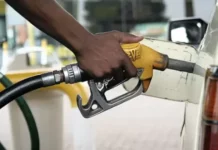The Chairman of Parliament’s Energy Committee, Emmanuel Kwasi Bedzrah, has rejected claims that government misled Ghanaians in the passage of the Energy Sector (Amendment) Act, 2025 — describing the accusations as “false, misleading, and politically motivated.”
Speaking at a press conference on Tuesday June 10, Bedzrah clarified that the GHC1 levy on fuel is a strategic intervention to rescue Ghana’s struggling power sector without hiking electricity tariffs.
“As of December 2024, the energy sector was bleeding, with a USD 3.1 billion debt — USD 1.7 billion of that owed to Independent Power Producers,” he said. “Every month, we run a GHC2 billion deficit just to keep the lights on.”
He argued that while the PURC had indicated a 50% tariff hike would be necessary to cover the cost of power generation, the Mahama-led government has chosen not to pass that burden to consumers.
Instead, the new levy is expected to raise approximately GHC5.7 billion annually, cushioning the sector while maintaining affordable electricity tariffs.
“This is not a deception,” Bedzrah emphasized. “It is responsible governance — ensuring reliable electricity without placing undue financial pressure on Ghanaians.”
Parliament recently passed the Energy Sector (Amendment) Act, 2025, introducing a GHC1 levy on every litre of refined petroleum product. The bill sparked criticism from the Minority in Parliament, who claim the move is deceptive and burdensome.
Background
Facing ballooning energy sector debts and high fuel costs, the government has introduced a GHC1 fuel levy through the Energy Sector (Amendment) Act, 2025. Some fear this may lead to fuel and electricity price hikes.
However, Ghanaians will not pay higher electricity tariffs despite a looming energy crisis — that’s the assurance from Emmanuel Kwasi Bedzrah, Chairman of Parliament’s Energy Committee, following the passage of the Energy Sector (Amendment) Act, 2025.
“President Mahama has made it clear — no tariff hikes. We’re protecting the Ghanaian household from a 50% electricity increase,” Bedzrah declared at a press conference on Tuesday.
He explained that Ghana spends over USD 1.2 billion annually on liquid fuels to power its thermal plants, yet the cost is not fully reflected in current tariffs.
To avoid overburdening consumers, the government is introducing a GHC1 levy per litre of refined fuel. “Even with the levy, fuel is still cheaper today — GHC12 per litre — than it was in January when it hit GHC16,” he added.
The levy is projected to raise GHC5.7 billion annually. Any shortfalls in financing power generation, Bedzrah said, would be covered by the Finance Ministry.
“This is a strategic way to raise funds without sacrificing stable power or draining household income. We’re transparent, we’re bold, and we’re doing what’s best for Ghanaians.”












